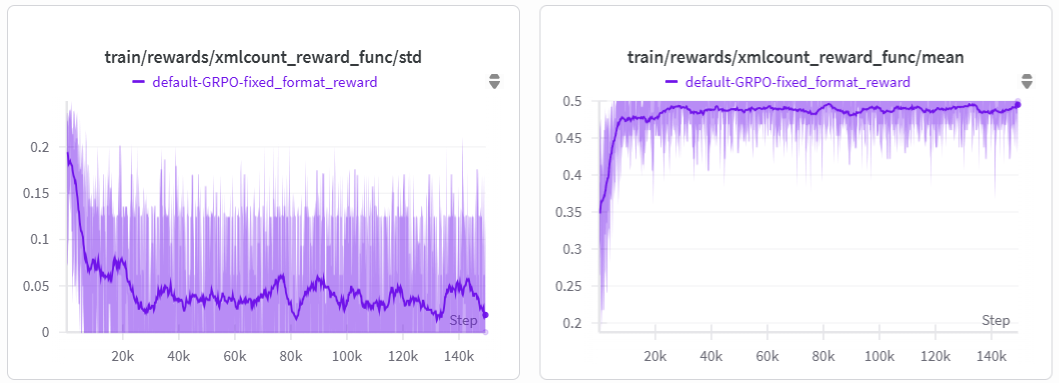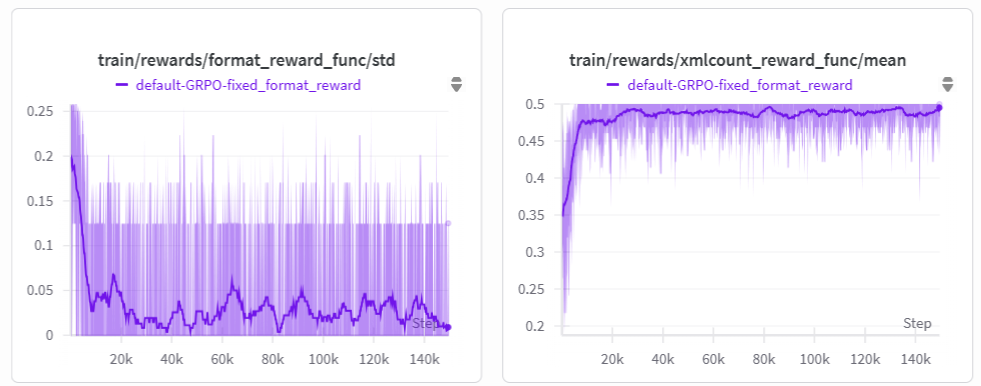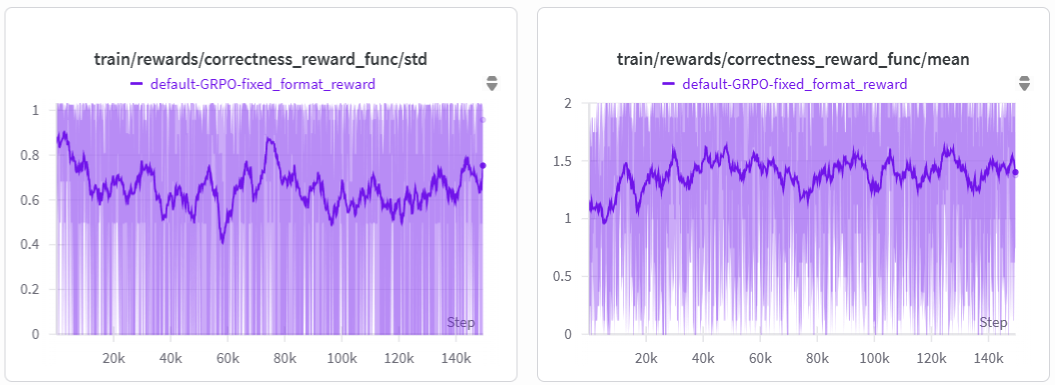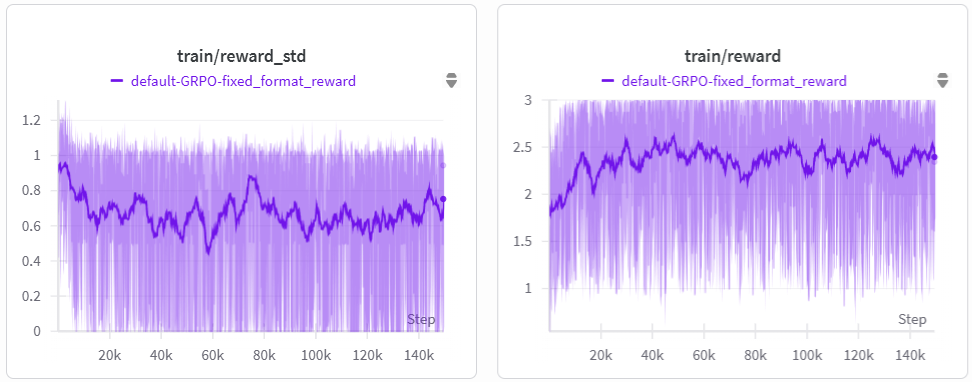1
2
3
4
5
6
7
8
9
10
11
12
13
14
15
16
17
18
19
20
21
22
23
24
25
26
27
28
29
30
31
32
33
34
35
36
37
38
39
40
41
42
43
44
45
46
47
48
49
50
51
52
53
54
55
56
57
58
59
60
61
62
63
64
65
66
67
68
69
70
71
72
73
74
75
76
77
78
79
80
81
82
83
84
85
86
87
88
89
90
91
92
93
94
95
96
97
98
99
100
101
102
103
104
105
106
107
108
109
110
111
112
113
114
115
116
117
118
119
120
121
122
123
124
125
126
127
128
129
130
131
132
133
134
135
136
137
138
139
140
141
142
143
144
145
146
147
148
149
150
151
152
153
154
155
156
157
158
159
160
161
162
163
164
165
166
167
168
169
170
171
172
173
174
175
176
177
178
179
180
181
182
183
184
185
186
187
188
189
190
191
192
193
194
195
196
197
198
199
200
201
202
203
204
205
206
207
|
import re
import torch
from datasets import load_dataset, Dataset
from transformers import AutoTokenizer, AutoModelForCausalLM
from peft import LoraConfig
from trl import GRPOConfig, GRPOTrainer
from math_verify import parse, verify
import os
import logging
logging.basicConfig(level=logging.INFO)
logger = logging.getLogger(__name__)
SYSTEM_PROMPT = """
The user asks a question, and the Assistant solves it.
The assistant first thinks about the reasoning process in the mind and then provides the user with the answer. The reasoning process and answer are enclosed within <think> </think> and <answer> </answer> tags, respectively, i.e., <think>\n reasoning process here \n</think>\n<answer>\n answer here \n</answer>.
"""
XML_COT_FORMAT = """\
<think>
{reasoning}
</think>
<answer>
{answer}
</answer>
"""
def extract_xml_answer(text: str) -> str:
"""Extracts the answer from XML-formatted text."""
try:
answer = text.split("<answer>")[-1].split("</answer>")[0].strip()
return answer
except IndexError:
logger.warning("Failed to extract answer from XML format.")
return ""
def extract_hash_answer(text: str) -> str | None:
"""Extracts the answer from a hash-formatted string."""
if "####" not in text:
return None
return text.split("####")[1].strip()
MODEL_NAME = os.getenv("MODEL_NAME", "Qwen/Qwen2.5-1.5B-Instruct")
if not MODEL_NAME:
raise ValueError("MODEL_NAME environment variable is not set.")
OUTPUT_DIR = os.getenv("OUTPUT_DIR", "outputs/default-GRPO")
if not OUTPUT_DIR:
raise ValueError("OUTPUT_DIR environment variable is not set.")
RUN_NAME = os.getenv("RUN_NAME", "default-GRPO-gsm8k")
if not RUN_NAME:
raise ValueError("RUN_NAME environment variable is not set.")
def get_gsm8k_questions(split="train", use_one_shot=False) -> Dataset:
"""Loads and prepares the GSM8K dataset with optional one-shot prompting."""
try:
data = load_dataset('openai/gsm8k', 'main')[split]
except Exception as e:
logger.error(f"Failed to load dataset: {e}")
raise
def format_example(x):
prompt = [{'role': 'system', 'content': SYSTEM_PROMPT}]
if use_one_shot:
prompt.extend([
{'role': 'user', 'content': 'What is the largest single-digit prime number?'},
{'role': 'assistant', 'content': XML_COT_FORMAT.format(
reasoning="9 is divisible by 3 and 8 is divisible by 2, but 7 is prime.",
answer="7 is the largest single-digit prime number."
)}
])
prompt.append({'role': 'user', 'content': x['question']})
return {'prompt': prompt, 'answer': extract_hash_answer(x['answer'])}
return data.map(format_example)
dataset = get_gsm8k_questions(use_one_shot=False)
def math_verify_answer(answer, golden_answer, **kwargs):
"""Verifies the answer using math_verify."""
gold_parsed = parse(golden_answer)
answer_parsed = parse(answer)
try:
return verify(gold_parsed, answer_parsed)
except Exception as e:
print(f"verify failed: {e}, answer: {answer_parsed}, gold: {gold_parsed}")
return False
def correctness_reward_func(prompts, completions, answer, **kwargs) -> list[float]:
"""Calculates reward based on correctness of the response."""
responses = [completion[0]['content'] for completion in completions]
q = prompts[0][-1]['content']
extracted_responses = [extract_xml_answer(r) for r in responses]
logger.info(f"Question:\n{q}\nAnswer:\n{answer[0]}\nResponse:\n{responses[0]}\nExtracted:\n{extracted_responses[0]}")
return [2.0 if math_verify_answer(r, a) else 0.0 for r, a in zip(extracted_responses, answer)]
def int_reward_func(completions, **kwargs) -> list[float]:
"""Calculates reward if the extracted response is a digit."""
responses = [completion[0]['content'] for completion in completions]
extracted_responses = [extract_xml_answer(r) for r in responses]
return [0.5 if r.isdigit() else 0.0 for r in extracted_responses]
def format_reward_func(completions, strict=False, **kwargs) -> list[float]:
"""Calculates reward based on XML formatting."""
pattern = r"^<think>\n.*?\n</think>\n<answer>\n.*?\n</answer>\n$" if strict else r"<think>.*?</think>\s*<answer>.*?</answer>"
responses = [completion[0]["content"] for completion in completions]
matches = [re.match(pattern, r, re.DOTALL | re.MULTILINE) for r in responses]
return [0.5 if match else 0.0 for match in matches]
def xmlcount_reward_func(completions, **kwargs) -> list[float]:
"""Calculates reward based on XML tag counts."""
contents = [completion[0]["content"] for completion in completions]
return [count_xml(c) for c in contents]
def count_xml(text) -> float:
"""Counts XML tags and penalizes extra content."""
count = 0.0
if text.count("<think>\n") == 1:
count += 0.125
if text.count("\n</think>\n") == 1:
count += 0.125
if text.count("\n<answer>\n") == 1:
count += 0.125
if text.count("\n</answer>") == 1:
count += 0.125
return count
try:
model = AutoModelForCausalLM.from_pretrained(
MODEL_NAME,
torch_dtype=torch.bfloat16,
).to("cuda")
model.config.use_cache = False
model.gradient_checkpointing_enable()
except Exception as e:
logger.error(f"Failed to load model: {e}")
raise
tokenizer = AutoTokenizer.from_pretrained(MODEL_NAME)
tokenizer.pad_token = tokenizer.eos_token
peft_config = LoraConfig(
r=16,
lora_alpha=64,
target_modules=["q_proj", "k_proj", "v_proj", "o_proj", "up_proj", "down_proj", "gate_proj"],
task_type="CAUSAL_LM",
lora_dropout=0.05,
)
training_args = GRPOConfig(
output_dir=OUTPUT_DIR,
run_name=RUN_NAME,
learning_rate=5e-6,
adam_beta1=0.9,
adam_beta2=0.99,
weight_decay=0.1,
warmup_ratio=0.1,
lr_scheduler_type='cosine',
logging_steps=1,
bf16=True,
per_device_train_batch_size=1,
gradient_accumulation_steps=4,
num_generations=16,
max_prompt_length=256,
max_completion_length=512,
num_train_epochs=1,
save_steps=100,
save_total_limit=2,
max_grad_norm=0.1,
report_to="wandb",
log_on_each_node=False,
)
trainer = GRPOTrainer(
model=model,
processing_class=tokenizer,
reward_funcs=[
xmlcount_reward_func,
format_reward_func,
correctness_reward_func
],
args=training_args,
train_dataset=dataset,
)
try:
trainer.train()
except Exception as e:
logger.error(f"Training failed: {e}")
raise
|




